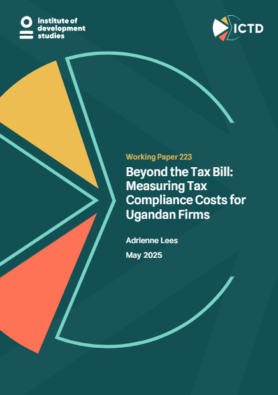Working Paper 223
For low-income countries looking to enhance revenue mobilisation without harming firm growth, understanding the full burden of taxation, beyond just tax liabilities, is crucial. This paper documents the substantial and often regressive tax compliance costs faced by small and medium-sized firms in Uganda. Using original survey data from nearly 2,000 taxpaying firms across Uganda, matched to administrative tax returns data, I show that compliance costs are significant, equivalent to two per cent of turnover for the median firm, with smaller firms bearing a disproportionate burden. Moreover, total compliance costs often exceed firms’ tax liabilities. Breaking down cost components, I find that labour time spent on tax compliance activities is the largest component, with tax compliance consuming a median of 34 hours of labour time per month, and approximately 20 per cent of firm owners’ working hours. I show that the majority of firms outsource at least part of their tax obligations to a tax agent, often to compensate for limited tax knowledge. These agents are relatively expensive, costing a median of US$54 per month. Adopting compliance technologies does not significantly reduce reported compliance costs or time, although firms perceive that technology makes compliance easier. Finally, I use a survey experiment to test how sensitive compliance costs measures are to the measurement strategy, finding significant divergence between estimates obtained through a detailed set of questions and a more aggregate question. Discrepancies between estimates are reduced when respondents are primed with the detailed set of questions first, suggesting that simple aggregate questions might not capture compliance costs in a consistent manner.
Watch now
In this video, Adrienne Lees summarises the findings of her paper
